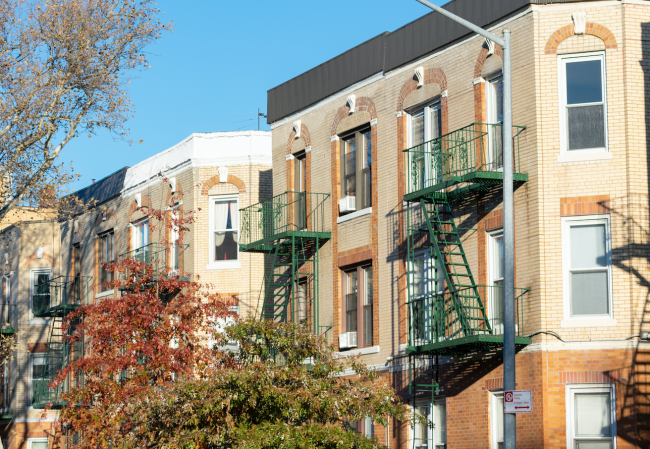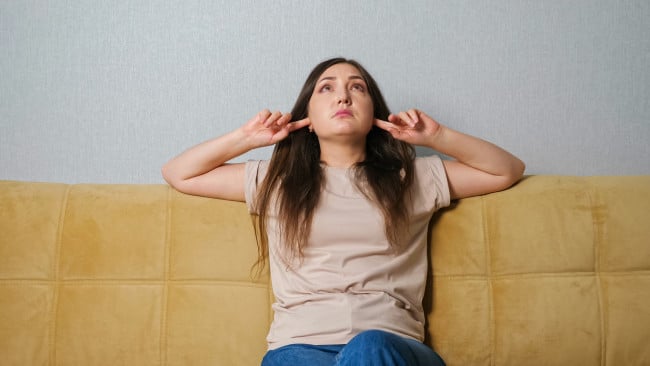How to deal with excessive noise from a neighbor in a NYC apartment building
- Try talking to your neighbor when you are calm and recruit other neighbors to support your case
- Document the dates, times, and types of disruptive noise in a log and with audio or video recordings
- Alert your landlord or property management—and hire an experienced attorney if the issue persists

Some noise from neighbors is inevitable, but you shouldn't have to live with noise that makes your apartment a living hell.
iStock
Living in a New York City apartment means being in close proximity to your neighbors 24/7—and dealing with a fair share of noise as a result. But what if noise from next door, above, or below is so disruptive that it interferes with your life?
According to a recent New York Times article analyzing NYC's 311 service logs, noise complaints topped the list with 738,816 requests—an average of more than 2,000 every day, and up from about 19 percent over 2023. Residential noise accounts for approximately half of those, including common nuisances such as loud music, shouting, and parties. No surprise, the problems peak after 10 p.m.
"We get calls like this all the time," said Alan Fierstein, founder and president of NYC acoustical consulting services firm Acoustilog. He's heard it all: An upstairs neighbor moves furniture and vacuums in the middle of the night, or a family just moved in with "active children" running around above your bedroom.
While excessively noisy neighbors can be challenging, there are practical steps you can take to address the issue while maintaining a good relationship or at least avoiding escalation.
The first tip is not to address a noise problem while it's happening (unless you fear someone's life is at stake—then you should call 911). Instead, pick a time when you are calm.
“Hearing noise from a neighbor can be very emotional—it's frustrating, irritating, and feels like you are being disrespected, so the first thing I tell clients is that the noise is not personal," said Altagracia Pierre-Outerbridge, attorney and founder of Outerbridge Law (FYI, a Brick sponsor) representing residential tenants, condo owners, and landlords.
The second tip is that a landlord or owner is required to maintain your apartment's safety and livability at all times, and excessive noise is one of the conditions they must address under the warranty of habitability.
That said, NYC’s dense, vertical environment means some noise is inevitable. Courts and law enforcement often expect residents to tolerate a reasonable amount.
Here’s a concise guide to dealing with extremely noisy neighbors based on the realities of NYC living.
Document and record the noise
To effectively address a noise issue, it's essential to keep a detailed log of disturbances, including dates, times, and the nature of the noise. This log serves as crucial evidence of a recurring problem when communicating with your neighbor or landlord about the issue.
Use a dedicated calendar to record every instance of the noise, including the date, time, and type of each disturbance. Record audio or video if possible (from within your own space to avoid legal issues). Apps like Decibel X, Decibel Pro, and SmarterNoise can transform your smartphone into a decibel meter, enabling you to measure, monitor, and record noise levels.
While initial documentation provides a sense of control, it may not be sufficient for legal action. For legal proceedings, you may need professional, costly sound level measurements, making a peaceful resolution a more practical goal.
Recruit other neighbors
If the noise is an issue throughout the building, or at least on your floor and the adjacent ones, you will stand a better chance of addressing it collectively. It's relatively easy for a landlord or board to shrug off one person's complaint, but not so easy to ignore multiple reports.
If you are nervous about talking to your neighbors, consider how relieved you would feel if they approached you with the same issue. Employ the same tactful approach as you would with the culprit—do not use hostile language or engage in idle gossip. Keep the conversation objective and focused on the noise, rather than the person causing it. Ask your neighbors' permission to record your conversations or take careful notes to document dates and times as described above. You can also create a Google Doc and share it with your neighbors, allowing them to comment directly and in real-time.
Talk to your neighbor
If it feels safe, approach your neighbor politely—never in the heat of the moment, when you're more likely to come off as hostile and use words you'll regret, suggested Michele Kirschbaum, director of programs at New York Peace Institute, which offers free mediation services for disputes in Manhattan and Brooklyn, including harassment, civil or criminal matters, and noise complaints.
Do this when you are calm to avoid confrontation—and in a spirit of collaboration and mutual understanding. One conspiratorial approach is to blame the noise on the building's thin walls, treating it as an issue that affects everyone, and keep the focus off the individual offender.
Just be clear about what noise you are talking about—they may not even realize that their noise bothers others, especially in close quarters like apartment buildings. Try a friendly note or in-person chat, e.g., “Hey, I’ve been hearing some loud music late at night and having a hard time sleeping—any chance you could lower the volume after 10 p.m.?”
However, Jacob Wood, a broker at Coldwell Banker Warburg who manages rentals for his owner-clients, cautioned against going this route.
"Unless you already have a good relationship with your neighbor, you may as well go directly to your landlord at the first sign of the issue to avoid an unnecessary confrontation," he said. "It’s only the landlord’s authority that carries weight anyway."
Wood cited a recent situation where a subtenant in a co-op left multiple notes for their upstairs neighbor, complaining about noise, and the co-op came down on the subtenant for harassment. "It’s best to go through the proper channels—your landlord or the building's managing agent—with any complaint, rather than contacting the offending party directly," he said.
Patricia Gilman, another broker at Coldwell Banker Warburg who also manages rentals, agreed with that strategy.
"If the noise is constant and incessant, I would hope the renter contacts me as the property manager, even if they have already contacted the building staff. I instruct my tenants to contact me with any concerns, and then we can determine how to address them," she said.
Alert your landlord
Start by reviewing your lease or building policies for any “quiet enjoyment” clauses or specific noise rules.
"Hopefully, the lease includes rules related to noise and repercussions for violations. If so, you should immediately and consistently enforce the terms of your lease," Wood said.
Even if you don't spot anything relevant, landlords must address conditions (including tenant-caused noise) that significantly disrupt your ability to use your apartment under what’s called the warranty of habitability. This is a set of livability requirements guaranteed by law in every lease, whether it is spelled out or not.
Contact your landlord or property manager in writing, detailing the issue and requesting intervention. Consider attaching your log and recordings to back up your complaint.
Before alerting the landlord, Fierstein recommends having the super, doorman, or other building staff stand in your apartment when the noise is happening to hear it firsthand.
"If they agree that the noise is pretty bad, they may go up and talk to your neighbor themselves, which is helpful because they have the authority of being related to the management," he said. They can also serve as a double check to make sure that you are not being overly sensitive, he added.
If the landlord doesn’t act—which, according to the experts Brick spoke to, is all too common—you may want to hire an acoustical expert to substantiate the noise level or go the legal route. (More on both options below.)
You can also consider free mediation services offered by organizations like the New York Peace Institute. They can facilitate a neutral conversation with your neighbor or landlord to find a resolution.
Hire a pro
The NYC noise code, enforced by the Department of Environmental Protection (DEP) and NYPD, regulates "unreasonable" noise levels (e.g., above 42 decibels indoors at night).
That can be a tough measure to prove without hiring an acoustical engineer, which can be pricey but essential if the matter escalates and you decide to sue in housing court. Fierstein noted that his company is also sometimes hired to make a recording to bring to a meeting with management or the board, with the goal of avoiding the time and expense of a lawsuit.
As he explained, smartphone recordings do not accurately capture low frequencies, such as footfalls and bass music—among the more common sounds that cause complaints. There's also no way to verify that the recordings are genuine or manipulated. (Visit the residential tab on Acoustilog's website for more information.)
That's why "calibrated recordings" by acoustical engineers are often necessary to prove your case. Fierstein said he will leave his recording system in your apartment for a week, and it can either run around the clock or you can turn it on when the noise is happening. The date and exact time of each occurrence are documented on the recording, allowing time-correlated graphs (similar to an EKG) of the noise disturbance to be created. This visual can help show a recurring problem—or a "pattern of nuisance" in legal parlance.
Equally importantly, the audio can be played back in court, so it approximates what it sounds like in your apartment at the time it happened. "This provides very convincing evidence. The judge doesn't have to imagine what '89 dB at 31.5 Hz' sounds like; we can demonstrate it," Fierstein said.
Expect to pay upwards of $1,000 for this kind of service, with the cost increasing depending on whether you retain the firm to meet with your landlord/management or to provide expert testimony in a trial.
To initiate the process, contact local companies such as Acoustilog, New York Soundproofing, and Brooklyn Insulation & Soundproofing to obtain a quote. Rates can fluctuate, so request proposals tailored to your needs.
Report it to the city
If the noise persists, call 311 or file a complaint online at nyc.gov/311. Noise from neighbors (e.g., loud music or parties) is handled by the NYPD as a non-emergency response. Provide specific details from your log.
If you suspect you are hearing signs of domestic violence or abuse, do not intervene directly. Call 911 and request a "wellness check" or report a more serious concern immediately.
Better yet, reach out to your local police department—every precinct has a domestic violence unit that you can turn to for guidance based on the details of your situation.
Organizations such as Safe Horizon, the Urban Resource Institute, and the New York State Coalition Against Domestic Violence all have hotlines that you can call for advice and resources in your specific neighborhood or borough.
If a neighbor threatens you, New York state law defines harassment as any conduct intended to annoy, threaten, intimidate, or alarm another person. If that sounds like your situation, there are steps you can take—including calling the police if you are ever physically in danger. Read: “Is your neighbor harassing you? Follow these 4 steps to handle the problem” for guidance.
Dampen the noise
If talking to your neighbor or landlord fails to resolve the issue, you may need to find ways to mitigate the noise while you consider other actions—or as a permanent solution if all else fails.
"Soundproofing is tricky for renters, who cannot legally do any construction without the landlord's permission, and good soundproofing usually requires construction," Fierstein said, adding that acoustical panels sold online are usually not 100 percent effective at blocking out noise.
Furthermore, he explained that sound emanating from a neighbor's apartment enters your space—the bedroom is where most of his clients experience disruptive noise—through multiple pathways. For example, noise from an upstairs or downstairs neighbor not only comes through the room's ceiling or floor but also through the walls. Similarly, noise from next door might be loudest through the separating wall, but it's also coming through the floor, the ceiling, and both side walls.
So to really seek relief, you would need to hire a soundproofing specialist to install the right materials—but not without your landlord's permission. Even if they approve, you may not want to foot the high bill.
Or you can rely on a noise machine or a (free) app with lots of different sounds. "You have to use a noise that is in roughly the same frequency range as the noise you are trying to mask, so white noise is good at masking high-frequency hissing but not low-frequency booms and rumbles, such as from loud music," Fierstein said. Use "brown" noise, meaning louder ambient sounds, such as recordings of a river or strong wind, for those culprits.
Noise-canceling headphones are also effective but can be difficult to wear when sleeping. Earplugs, on the other hand, are more convenient but will not block out those bass beats. Experiment to determine which tools work in your situation.
Consider breaking your lease
If the situation is intolerable and you are deciding whether to remain in your apartment, you may be able to negotiate an early termination of your lease. Be aware that breaking your lease comes with risks, so approach this idea with your landlord carefully.
You'll need to adhere to the typical 30-day notice requirement and provide written notice, preferably in a demand letter drafted by an attorney.
"Then the landlord has a duty to mitigate the damages by finding another tenant for your apartment, and that notice period is beneficial because you become a witness to their failure to mitigate if they never show your place," Outerbridge said.
Sue the landlord
If you are intent on staying in your apartment, Outerbridge said that noise is a condition just like a lack of heat or hot water, and that your remedies are also the same—including withholding rent. Always seek legal help to understand all potential outcomes, as the landlord may end up suing you for failure to pay.
"Noise is one of the hardest issues to litigate about, though some courts have likened it to an intrusion," Outerbridge said. Given the high cost of litigation, she advises people that they might be better off moving into another apartment. In her experience, however, most people prefer to stay—maybe they love the location, their kids attend school nearby, or the rent is reasonable. Plus, finding another apartment is never easy in NYC.
"The big issue, however, is how the courts view noise complaints, and it can be very difficult to convince them that the noise rises to the level of being a nuisance," she said.
That's why she recommends having an attorney send a formal demand letter to the landlord, laying out the evidence and essentially stating that either they must install soundproofing or face court proceedings.
"Soundproofing is very expensive, so some landlords will ignore the letter, though one landlord is currently installing it after receiving the demand," Outerbridge said, noting that many would rather pay thousands on soundproofing than the potentially greater and unknown amount of legal fees.
To see if you qualify for free legal assistance, contact the Legal Aid Society or Legal Services NYC. You can also call 311 and ask for the Tenant Helpline, where counselors are available to offer resources. Renters who are facing eviction in Housing Court are guaranteed access to free legal representation or advice under the NYC Department of Social Services.
Tenants living in rent-controlled or rent-stabilized apartments can contact the New York State Division of Housing and Community Renewal.
Make a disability claim
Beginning during the pandemic, Outerbridge has had success pursuing noise complaints with the New York City Commission on Human Rights, which focuses on discrimination and harassment in housing based on protected characteristics (e.g., race, gender, disability, age, source of income, marital status, sexual orientation, and others).
If you have a disability, such as insomnia, depression, PTSD, or anxiety, that is caused or worsened by the neighbor's noise, then the landlord is required to make reasonable accommodations, including soundproofing or other measures.
Again, Outerbridge said that alerting the landlord of your intention to go this route in a formal demand letter will often get them to do the right thing under the law—without actually having to step inside a courtroom.
You Might Also Like





























